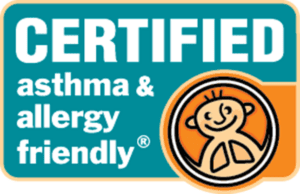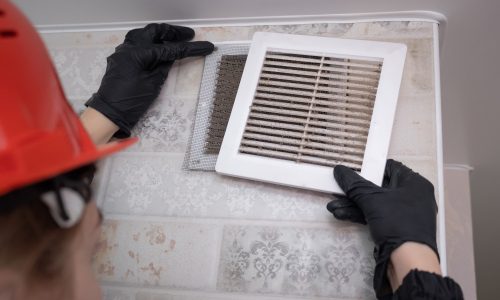In recent years, there has been a remarkable surge in awareness surrounding the importance of indoor air quality (IAQ) and its significant impact on health and well-being. As we spend an increasing amount of time indoors – up to 90% of our time – the quality of the air we breathe is an essential factor in maintaining a healthy lifestyle. This growing recognition has led to a burgeoning market for indoor air quality systems and standards that aim to create healthier living environments.
While the indoor air quality market continues to evolve, it is crucial to emphasize the need for education and consumer awareness around indoor air quality. Through education we can empower individuals, building professionals and housing authorities to make informed decisions.
Understanding Indoor Air Quality

Surprisingly, indoor air can be two- to five-times more polluted than outdoor air. Indoor air pollutants can include volatile organic compounds (VOCs), tobacco smoke, mold, dust mite allergens, pet dander, and chemical cleaning products as well as pollutants entering the building from outside. These pollutants can accumulate in enclosed spaces, leading to higher concentrations and prolonged exposure.
Poor IAQ has been linked to various health risks – immediate effects such as eye, nose, and throat irritation, headaches, dizziness, and fatigue. Long-term exposure has been linked to the development of respiratory diseases, cardiovascular problems, and even cancer. For those impacted by asthma and allergies, these pollutants can exacerbate their symptoms. Furthermore, poor indoor air quality can have a disproportional impact on vulnerable populations such as children, the immunocompromised and the elderly.
The Role of Indoor Air Quality Systems
IAQ systems – whole home cleaners, HVAC (Heating, Ventilation, and Air Conditioning) systems, portable air purifiers, humidifiers and vacuums with HEPA filters – can each play a vital role in maintaining a healthy and comfortable living environment. Using sensors and filters, they can regulate indoor air pollutants and reduce health risks from exposure.
By effectively reducing allergens and asthma triggers from the indoor air, they can provide relief for those impacted by respiratory conditions. They can also help create more comfortable living conditions, for example by balancing humidity levels. Moreover, cleaner air can lead to an improved sleep environment.
How Indoor Air Quality Standards Can Help You Find the Right System
There are two main types of air cleaners or purifiers: single-room products and whole-house systems. Single-room products, like portable air cleaners, are effective for targeting pollutants in a particular room but may not address IAQ concerns in other parts of the house. When choosing a portable air cleaner, the room size and level of activity should be taken into account.
On the other hand, whole-house systems, such as whole-home cleaners, integrate with the central HVAC system to purify the air throughout the entire building. They offer a more comprehensive approach, though may require a level of remodeling and cost that must be taken into consideration.

A comprehensive IAQ solution should cater to specific requirements to provide a tailored and efficient solution. Different rooms may have varying levels of pollutants. Dr. John McKeon, Principal of the iAIR Institute, the leading organization that promotes and implements solutions for healthy indoor air, advises “The bedroom is an important place to consider, given how much time we spend there. Those with allergies to dust mite allergens can benefit from using a humidifier in the bedroom to lower humidity levels and to utilize a proper vacuum with an effective filter.”
Certification programs can provide valuable information and guidance to consumers and building professionals on performance, efficiency, and safety of indoor air quality products. Certified products undergo rigorous testing and meet specific standards, assuring consumers of their effectiveness.
The asthma & allergy friendly® Certification Program, run in partnership with Allergy Standards Ltd and the Asthma and Allergy Foundation of America (AAFA) is one such program designed for indoor air quality systems. Certification by the asthma and allergy friendly® Certification Program means that very strict scientific tests are carried out on the product. Many of these tests are unique to the asthma & allergy friendly® Certification Program and manufacturers voluntarily submit their products for independent tests to validate claims.
Maintaining and Optimizing IAQ Systems
Regular maintenance plays a vital role in maximizing the efficiency and effectiveness of IAQ systems by preventing issues such as mold growth and filter clogging. Tips for maintaining and optimizing IAQ systems include scheduling routine inspections, cleaning or replacing air filters regularly, monitoring humidity levels, and ensuring proper airflow.
Dr. McKeon points out that “It’s important with a whole-house air cleaning system to remember to maintain it. It’s easy to forget about a system that is built in. Change filters and conduct maintenance as per the manufacturer’s instructions to keep your system working optimally.”
Conclusion
Poor air quality can lead to a range of health issues, including allergies, asthma and other respiratory problems. Implementing indoor air quality systems that follow strong standards can effectively reduce pollutants, circulate air, and maintain optimal humidity levels to help create a healthier and comfortable built environment. Investing in these systems is an investment in long-term health and it’s worth taking action today.

Dr. Anna O’Donovan, Medical & Lifestyle Author with Allergy Standards Ltd. Anna is a qualified doctor who worked in both hospital medicine and as a General Practitioner for a number of years. Anna studied medicine in Trinity College, Dublin, Ireland graduating with an honors degree in Medicine in 1997.
Anna is also a qualified Dentist graduating in 2003 with an honors degree and won the prize in oral medicine, oral surgery and oral pathology. She is mum of three children. Her eldest daughter has allergies and she is impacted by allergies and asthma herself.







